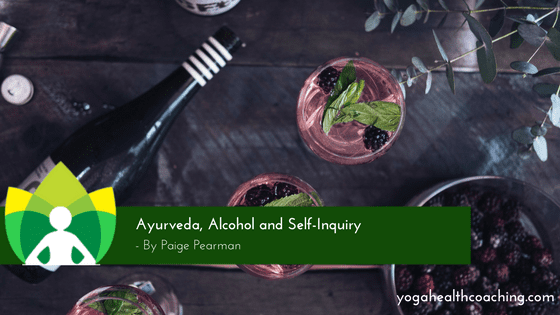
Ayurveda, Alcohol and Self-Inquiry
While I studied Ayurveda at the California College of Ayurveda, the head of the college talked about giving up alcohol as he progressed on his Ayurvedic path. I was impressed by his discipline and fortitude. He no longer drank a nice cold beer, a tasty vino, or cocktail. But in my mind, was it worth it? Would giving up alcohol put you further in touch with your true nature as spirit – one of the core principles of Ayurveda? Did alcohol really distract you from your spiritual path and healing?
When In France…Drink Wine!
My junior year in college, I studied in Montpellier, France in the Languedoc-Roussillon region where some of the finest wines in the world are made. One of my courses was in wine tasting, and I would travel around the region to vineyards tasting my way through Southern France. During this time, I grew a great appreciation for fine wines. Let me also say that during this time, even though the French are notoriously known for being thinner than Americans, I weighed more than I have ever weighed in my life outside of my two pregnancies. My body just wasn’t doing a very good job at processing all that sugar even at the ripe age of 21. When I returned to the Bay Area at Mills College, my parents would take me to Napa Valley where I also enjoyed some of the finest wines made here in the States. Over the years, I developed an affinity for dry wines, champagne, and my summer drink a bitter gin and tonic. I love fine dining and trying the newest cocktail to pair with my appetizer, and a wine to pair with my dinner. And I am partnered with a husband who is a Bourbon connoisseur, which makes it all that more enticing to want to bond with your partner over a drink.
Ojas and Alcohol
Almost two years have passed since I began seriously practicing Ayurveda. In the beginning, I wasn’t willing to give up alcohol, and there’s no rule in Ayurveda that says I should per say. In Ayurveda, alcohol can be used medicinally or it can be a toxin. If you have low Ojas, like I do, then alcohol is not recommended as it has the opposite effect on ojas. Ojas in Sanskrit means vigor, and thus is thought to be responsible for vitality, strength, health, immunity and mental and emotional wellness. Vatas tend to have lower Ojas than say a Kapha or Pitta because as a dosha Vatas deplete more quickly. When someone has an autoimmune disease or has faced life trauma, they also have low ojas. Similar to our immune system, ojas also means a deep emotional well or reserve. When your body is healing, then you must rebuild your ojas. Alcohol diminishes our reserves of ojas. If you have a low digestive fire, like me, then alcohol is also not recommended. Instead, Ayurveda is about raising self awareness, listening to your subtle body and attuning to your digestive fire, the season, your constitution and the food you are pairing it with.
Self Awareness Sheds Light on the Effects of Alcohol
Since I began studying Ayurveda, I have found that my appreciation for alcohol has waned. Through my daily practice of yoga and meditation, I have begun to honor my body. The days when I have a drink or two the stenosis in my neck becomes worse, I get headaches, I feel more drained, fatigued, dehydrated, and have more muscle and joint stiffness. I have a Vata-Pitta Prakriti, and a Vata Vikriti. I’m a lightweight so one drink alone can leave me feeling like hell and push me over the edge. Furthermore, drinking alcohol is too drying for my constitution, and I can feel it at night when I go to bed. I wake up thirsty, I urinate more in the night because I am up drinking water to make up for what I didn’t drink the night before I went to bed. When I urinate, I feel a drying, burning sensation, and wine gives me cystitis, which causes urinary frequently (Vata-Pitta Vikriti).
I Felt Like a Lunatic!
Prior to drastically reducing my alcohol consumption, the urinary frequency at night and neck pain was giving me insomnia. I was up just about every hour of the night sometimes only getting three to four hours of solid sleep. I blamed insomnia on my stenosis. I went to see many healers for my stenosis. Yet my chiropractor, physical therapist, naturopath, functional doctor, never once said to try eliminating alcohol to see if that helps. I would literally get up in the night do yoga postures to soothe the aches and pains away so that I could go back to sleep, and by then I was up with the Moon, I literally felt like a lunatic. I was exhausted, strung out, and in horrible pain. My neck would hurt so bad that even though I had one drink or two, I felt totally hungover. This insomnia literally went on for 10 years until I realized that alcohol was one of the biggest culprits. In Ayurveda, when the doshas are out of balance, we have accumulation, aggravation, and overflow. At this point, the symptoms are mild.
Imbalance 2.0
During the next pathological phase, the doshic imbalance will overflow and go from mild symptoms to more severe. At this point, the doshic imbalance will go to the weakest point in the body. For me, that is where I have stenosis or neck pain. The next pathway of disease is relocation, manifestation, and diversification. That is when it gets a western name like stenosis. Thus, my imbalance had been in the works for years before it became so severe. Little did I know that my casual glass of wine at night was one of the biggest contributors. Before eliminating alcohol from my evening meal, I never knew that it was causing me such debilitating pain and insomnia. I was never a heavy drinker. I didn’t think a glass of wine three or four nights a week was a problem, and it certainly wasn’t raising any flags with anyone I spoke to about my pain and insomnia.
No Western Diagnosis for Being out of Balance
Before Ayurveda, I remember meeting with my primary doctor asking her why I was up drinking and urinating so much at night. She said I didn’t’ have any symptoms of being pre-diabetic, and she had no Western diagnosis for me. Over the years, I suffered many UTI’s, kidney infections, and was on many rounds of antibiotics to treat them. This lead to gut health issues from the antibiotics further depleting my digestive fire and ojas. Then when I met with my functional doctor, he said that alcohol was causing cystitis. It turns out I have a genetic trait that makes it hard to process and detoxify sulfites well. The wine has a lot of sulfites.
Alcohol and Anxiety
Over the past couple of years, I’ve gone from drinking a glass of wine at night to just having a gin and tonic on a Friday or Saturday night or a cocktail at a special dinner. At the beginning of 2018, I decided to take a bold step and try to eliminate as much alcohol from my activities as possible. As mentioned earlier, I am married to a bourbon connoisseur, I live in a town of Bourbon drinkers, and my family bonds over wine and cocktails. I know that my appreciation for alcohol isn’t just the taste. I know that I love the relaxation that it brings, and how it helps me deal with my Vata anxiety in social situations.
Benefits of Building Body Thrive Habits
Since reducing my alcohol consumption, I find I have higher energy levels, stamina, clarity, and a greater connection with the people around me. Alcohol is such a great icebreaker in social situations, but my goal is to be more authentic with those around me, and not to hide behind any anxiety that I have through a glass of wine or cocktail. I don’t want to use alcohol to feel more free and uninhibited, less anxious or to chill myself the f$#@%! out when I am stressed out. If I didn’t have this practice, I probably wouldn’t notice the difference. The thing about Ayurveda is that you don’t know how good you can feel until you feel it. I’ve realized that when I am triggered by stress, I am more inclined to drink. Several years ago, when I read my first book on Ayurveda, I put it down and thought this practice is way too intense for me. Going to bed early, waking up early, practicing yoga and meditation daily, and eating a plant-based diet was more than I could commit to. I wasn’t willing to make the changes necessary to heal my body. I just didn’t want to believe that I had to change my lifestyle. Now I know the hard truth that alcohol just doesn’t make me feel good, and that it holds me back from being truly authentic with those around me. I’ve also found that by not drinking it shines a light on those who are drinking. It also sheds light on what some friendships and relationships are based on.
It’s Time for a Toast
While I haven’t given up alcohol 100 percent, my goal is to save it for the rarest of opportunities to celebrate a wedding or a momentous occasion. As I have become aware when I drink and don’t drink, over time I have evolved to want it less and less. At this point, I see it is something to be enjoyed with good friends and good food as it’s done in the Blue Zones. The Blue Zones are the areas of the world that have the largest number of centenarians. Think about it this way, in a modern society, our bodies are bombarded to detoxify the chemicals in our air, food and water. Our livers are working overtime to try and break down these toxins and alcohol puts an additional burden on the liver.
I Want to Feel Fulfilled
The truth is in American culture, we have made alcohol something to be enjoyed all the time just like sugar and caffeine. We have come to regulate our circadian rhythms using caffeine and alcohol to lift us up and bring us back down rather than having the body habits that we need to regulate our mood and energy levels. Who knows where I will be as I progress on this journey, but I can say that one of the biggest factors in reducing my chronic pain, fibromyalgia, and joint and muscle pain has been my drastic reduction in alcohol consumption. There may come a day when I no longer desire alcohol at all as I tap into deeper and greater levels of fulfillment naturally. What I do know is that I am more hydrated, clear, and have greater levels of clarity and energy without it. I recommend eliminating for anyone wanting to feel pain free, less anxious or stressed out to eliminate alcohol for a few weeks to notice any shifts in your own well-being? We don’t know how well we can feel until we feel it through self-inquiry, trial and error, and experimentation.



